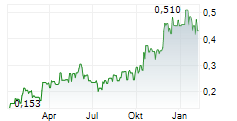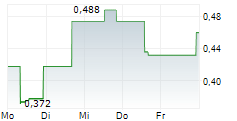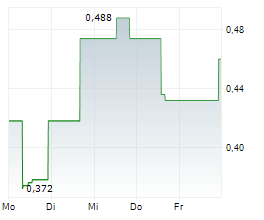
Vancouver, British Columbia--(Newsfile Corp. - February 6, 2024) - Cabral Gold Inc. (TSXV: CBR) (OTC Pink: CBGZF) ("Cabral" or the "Company") is pleased to announce assay results from an additional 12 RC holes testing near-surface oxide material at the Machichie Main Zone, Cuiú Cuiú gold district in northern Brazil. These holes are part of a drill program designed to better define and quantify the saprolite and blanket gold-in-oxide mineralization at the Machichie target, which is located just 500m northwest of the MG gold deposit and could have an impact on the current plans for trial-mining oxide material in that area.
Highlights
- RC409 returned 30m @ 2.6 g/t gold from surface in mineralized basement saprolite material including 12m @ 5.6 g/t gold from 11m depth
- RC418 returned 9m @ 4.3 g/t gold in mineralized fresh rock from 41m depth including 2m @ 18.6 g/t gold at the start of the 9m interval
- RC414 returned 13m @ 1.6 g/t gold from surface in mineralized saprolite, including 6m @ 2.8 g/t gold from 4m depth
- Other significant new mineralized saprolite drill intercepts include 7m @ 2.7 g/t gold from 7m depth in hole RC411, 15m @ 0.6 g/t gold from surface in hole RC412 and 18m @ 0.6 g/t gold from surface in hole RC413
Alan Carter, Cabral's President and CEO commented, "These additional RC drill results from Machichie confirm the presence of a significant zone of near surface gold-in-oxide mineralization at Machichie which appears to overlay another primary gold deposit. Further drilling will be required to fully define the limits to both the weathered gold-in-oxide mineralized material and the underlying hard-rock mineralized zone which was the focus of previous drilling. Both of these zones remain open along strike and to depth. The proximity of Machichie to the MG gold deposit has significant positive implications for the overall near surface gold-in-oxide resources which are amenable to heap leaching at Cuiú Cuiú, as well as the underlying resource base in fresh intrusive basement rocks."
Machichie RC Drill Results
The Machichie target is located 500m northwest of the MG gold deposit (Figure 1). Previous diamond drilling testing the Machichie Main zone identified an east-trending, steeply north-dipping mineralized zone which is persistent along strike for at least 900m (see press release dated October 24, 2022). The Machichie Main zone comprises several parallel high-grade core zones surrounded by a low-grade alteration envelope. The geology at Machichie is very similar in style to the nearby MG and Central gold deposits as well as the PDM discovery.
As at Central, MG and PDM, the upper portion of the basement mineralized zone at Machichie has weathered over millions of years creating a layer of soil and saprolite (weathered bedrock) which also appears to contain gold. Previous drilling has largely been focused on testing the underlying fresh basement mineralization. During those earlier programs, several holes encountered gold in oxidized weathered material above the primary basement gold mineralization but the distribution was poorly defined due to lack of drilling.
The current RC drill program at Machichie was designed to identify and better define higher-grade zones within the gold-in-oxide material that could add to the current gold-in-oxide resource at Cuiú Cuiú and could positively impact plans for trial mining. The results from the initial nine RC holes drilled as part of the current program were very encouraging (see press release dated January 25, 2024), and included 23m @ 1.1 g/t gold from surface in RC399 and 23m @ 0.5 g/t gold from surface in RC402. Assay results included in the current press release pertain to drill holes RC408 through RC419.

Figure 1: Map showing Machichie Main zone with interpreted outlines of mineralized zones identified to date. Current RC drill results (holes RC408 to RC419) as well as previous RC results (holes RC399 to RC407) and diamond drill results from the gold-in-oxide material are also shown. Both the MG and Machichie mineralized zones are shown in the inset. The limits to the gold-in-oxide blanket at Machichie is currently unknown. Terms; g/t = grams / tonne, m = metres
To view an enhanced version of this graphic, please visit:
https://images.newsfilecorp.com/files/3900/196981_9190e35604999b94_002full.jpg
Section 553230
Drill holes RC409 and RC410 were drilled on section 553230 in the eastern part of the Machichie Main zone (Figures, 1 and 2, Table 1). The holes were designed to follow up on the higher-grade zone of gold-in-oxide mineralization intersected previously in RC hole RC041 which previously returned 19m @ 0.9 g/t.
Hole RC409 was drilled from north to south and intersected 30m @ 2.6 g/t gold from surface in mineralized sediments and basement saprolite, including 12m @ 5.6 g/t gold from 11m depth This interval also includes a 6m @ 8.7 g/t gold from 16m depth (Figure 2). This mineralized zone is interpreted to be the same as that intersected in RC399 which returned 23m @ 1.1 g/t gold on section 553180, 50m to the west (see press release dated January 25, 2024 and Figure 1).
Drill hole RC410 was drilled 25m to the north of RC409 and intersected a second mineralized zone returning 16m @ 0.3 g/t gold from surface and 6m @ 1.9 g/t gold from 20m depth. Both mineralized zones were intercepted on section 553180 by RC400 and RC401.

Figure 2: Section 553230 through the Machichie gold-in-oxide blanket / saprolite and underlying primary mineralized zone in basement rocks showing results from RC holes RC409 and RC410. Terms; g/t = grams / tonne, m = metres, ppm = parts per million or grams / tonne
To view an enhanced version of this graphic, please visit:
https://images.newsfilecorp.com/files/3900/196981_9190e35604999b94_003full.jpg
Section 552790
Holes RC417 and RC418 were both drilled on section 552790, which had only one previous drill hole, RC058 which returned 1m @ 2.5 g/t gold from 87m in basement rocks (see press release dated March 31, 2021). Both new holes were drilled north to south, and were designed to test the near-surface extension of the mineralized zone previously encountered in RC058 (Figures 1 and 3, Table 1).
RC417 cut the same mineralized interval higher up in oxidized sediments and saprolite and returned 10m @ 0.5 g/t gold from surface. RC418 encountered the same zone slightly deeper, at the base of the weathered profile, returning 5m @ 0.3 g/t gold in basement saprolite, and 9m @ 4.3 g/t gold from 41m depth including 2m @ 18.6 g/t gold from 41m in mineralized fresh basement rock.

Figure 3: Section 552790 through the Machichie Main zone showing the near surface gold-in-oxide saprolite layer and assay results for drill holes RC417 and RC418. Previous RC hole RC058 is also shown. Terms; g/t = grams / tonne, m = metres, ppm = parts per million or grams / tonne
To view an enhanced version of this graphic, please visit:
https://images.newsfilecorp.com/files/3900/196981_9190e35604999b94_004full.jpg
Section 552900
Holes RC413 to RC416 were all drilled on section 552900 (Figures 1 and 4, Table 1). Previous diamond drilling on this section defined two mineralized zones in basement granitic rocks (see press release dated March 31, 2021 and October 24, 2022). DDH299 returned 7.6m @ 4.7 g/t gold and DDH312 returned 10.6m @ 0.4 g/t gold, again in basement granitic rocks at depth. The near surface oxidized material had not been previously tested.
RC413 and RC414 confirmed gold mineralization extends to surface within oxide weathered material. RC413 cut 18m @ 0.6 g/t gold from surface in basement saprolite, including 6m @ 2.8 g/t gold from 4m, RC414 intersected 13m @ 1.6 g/t gold from surface in mineralized basement saprolite.

Figure 4: Section 552900 through the Machichie Main zone showing the near surface gold-in-oxide saprolite layer and assay results for recent RC drill holes RC413 and RC416, as well as results for previous holes DDH299, DDH312 and RC060. Terms; g/t = grams / tonne, m = metres, ppm = parts per million or grams / tonne
To view an enhanced version of this graphic, please visit:
https://images.newsfilecorp.com/files/3900/196981_9190e35604999b94_005full.jpg
| Drill Hole | Weathering | From | to | Width | Grade | ||
| # | m | m | m | g/t gold | |||
| RC0408 | Blanket/Saprolite | 0.0 | 5.0 | 5.0 | 0.29 | ||
| EOH | 19.0 | ||||||
| RC0409 | Blanket/Saprolite | 0.0 | 30.0 | 30.0 | 2.56 | ||
| incl. | 11.0 | 23.0 | 12.0 | 5.58 | |||
| and incl. | 16.0 | 22.0 | 6.0 | 8.73 | |||
| EOH | 34.0 | ||||||
| RC0410 | Blanket/Saprolite | 0.0 | 16.0 | 16.0 | 0.27 | ||
| 20.0 | 26.0 | 6.0 | 1.92 | ||||
| EOH | 28.0 | ||||||
| RC0411 | Blanket/Saprolite | 0.0 | 3.0 | 3.0 | 1.21 | ||
| 7.0 | 14.0 | 7.0 | 2.66 | ||||
| incl. | 11.0 | 13.0 | 2.0 | 8.85 | |||
| EOH | 20.0 | ||||||
| RC0412 | Blanket/Saprolite | 0.0 | 15.0 | 15.0 | 0.60 | ||
| incl. | 8.0 | 14.0 | 6.0 | 1.20 | |||
| EOH | 21.0 | ||||||
| RC0413 | Blanket/Saprolite | 0.0 | 18.0 | 18.0 | 0.60 | ||
| incl. | 11.0 | 15.0 | 4.0 | 1.50 | |||
| EOH | 27.0 | ||||||
| RC0414 | Blanket/Saprolite | 0.0 | 13.0 | 13.0 | 1.60 | ||
| incl. | 4.0 | 10.0 | 6.0 | 2.76 | |||
| EOH | 21.0 | ||||||
| RC0415 | Blanket/Saprolite | N.S.V. | |||||
| EOH | 18.0 | ||||||
| RC0416 | Blanket/Saprolite | 16.0 | 18.0 | 2.0 | 0.53 | ||
| EOH | 18.0 | ||||||
| RC0417 | Blanket/Saprolite | 0.0 | 10.0 | 10.0 | 0.47 | ||
| EOH | 29.5 | ||||||
| RC0418 | Blanket/Saprolite | 36.0 | 41.0 | 5.0 | 0.31 | ||
| Fresh Rock | 41.0 | 50.0 | 9.0 | 4.25 | |||
| incl. | 41.0 | 43.0 | 2.0 | 18.58 | |||
| EOH | 50.0 | ||||||
| RC0419 | Blanket/Saprolite | N.S.V. | |||||
| EOH | 22.0 | ||||||
Table 1: Drill results from near surface Machichie gold-in-oxide blanket / saprolite zone regarding holes RC408 to RC419.
Terms; g/t = grams / tonne, m = metres, N.S.V. = no significant values
The current drill results from Machichie together with those previously reported (press release dated January 25, 2024) confirm the presence of gold in weathered basement saprolite mineralization extending to surface from depth, and containing zones of higher-grade mineralization. Machichie is located just 500m northwest of the MG deposit. The thickness, depth of weathering profile, and lateral extent of this zone at Machichie have not yet been well defined. The identification of this higher-grade gold-in-oxide material at Machichie could have significant positive implications for the ongoing PFS aimed at trial mining and heap-leach processing of the near surface gold-in-oxide resources at Cuiú Cuiú.
Results are still pending on 13 RC holes from Central and nine shallower power-auger holes at MG.
About Cabral Gold Inc.
The Company is a junior resource company engaged in the identification, exploration and development of mineral properties, with a primary focus on gold properties located in Brazil. The Company has a 100% interest in the Cuiú Cuiú gold district located in the Tapajós Region, within the state of Pará in northern Brazil. Two main gold deposits have so far been defined at the Cuiú Cuiú project which contains National Instrument 43-101 compliant Indicated resources of 21.6Mt @ 0.87 g/t gold (604,000 oz) and Inferred resources of 19.8Mt @ 0.84 g/t gold (534,500 oz) as per the 43-101 technical report dated October 12, 2022.
The Tapajós Gold Province is the site of the largest gold rush in Brazil's history which according to the ANM (Agência Nacional de Mineração or National Mining Agency of Brazil) produced an estimated 30 to 50 million ounces of placer gold between 1978 and 1995. Cuiú Cuiú was the largest area of placer workings in the Tapajós and produced an estimated 2Moz of placer gold historically.
FOR FURTHER INFORMATION PLEASE CONTACT:
"Alan Carter"
President and Chief Executive Officer
Cabral Gold Inc.
Tel: 604.676.5660
Guillermo Hughes, MAusIMM and FAIG., a consultant to the Company as well as a Qualified Person as defined by National Instrument 43-101, supervised the preparation of the technical information in this news release.
Neither the TSX Venture Exchange nor its Regulation Services Provider (as such term is defined in the policies of the TSX Venture Exchange) accepts responsibility for the adequacy or accuracy of this release.
Forward-Looking Statements
This news release contains certain forward-looking information and forward-looking statements within the meaning of applicable securities legislation (collectively "forward-looking statements"). The use of the words "will", "expected" and similar expressions are intended to identify forward-looking statements. These statements involve known and unknown risks, uncertainties and other factors that may cause actual results or events to differ materially from those anticipated in such forward-looking statements. Such forward-looking statements should not be unduly relied upon. The Company believes the expectations reflected in those forward-looking statements are reasonable, but no assurance can be given that these expectations will prove to be correct.
Notes
Gold analysis has been conducted by SGS method FAA505 (fire assay of 50g charge), with higher grade samples checked by FAA525. Analytical quality is monitored by certified references and blanks. Until dispatch, samples are stored under the supervision the Company's exploration office. The samples are couriered to the assay laboratory using a commercial contractor. Pulps are returned to the Company and archived. Drill holes results are quoted as down-hole length weighted intersections.

To view the source version of this press release, please visit https://www.newsfilecorp.com/release/196981
SOURCE: Cabral Gold Inc.




